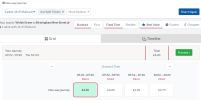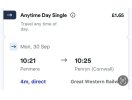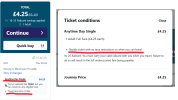Frankly this whole situation is absolutely ridiculous.
If 'the railway' is capable of selling a ticket with a railcard discount, it should be capable of displaying that said ticket is only valid at the times where the railcard discount is valid. How that is implemented in the back end systems should not be the customer's concern, and being caught out in this way and being prosecuted for a ticket which clearly states that it is valid at any time is absolutely ludicrous, regardless of what is written in the small print.
Even further, if a customer ends up on a train with such a ticket and gets checked, being prosecuted and potentially ending up with a criminal record is entirely disproportionate, particularly assuming they have a ticket from the origin to the destination. An excess to the undiscounted fare (potentially with a £10 admin fee) would be reasonable. A small penalty fare (up to e.g. £20) could be argued for, but prosecution and fines in the hundreds of pounds is simply not proportionate. I would argue the same for excessing advance tickets as well.
A law degree and several hours of regularly reading (constantly changing) T&Cs and small print should not be a prerequisite for using the railways without being prosecuted. There are ways to manage fare irregularities in signficantly stricter ways without being disproportionate. For example, a centralised penalty fare database in which successive fare irregularities within a certain period come with increasing penalties, with prosecution (for fraud) coming after a certain number of strikes and handled by the CPS would be one option.
In any case, the onus should be on the railway to (re-)design its ticketing structures and retail systems in such a way that the rules are absolutely clear for everyone involved and that honest mistakes never result in prosecution. If that means that some revenue is lost due to fraud being misidentifed as an honest mistake, then so be it, but the reverse should just not be happening.
If 'the railway' is capable of selling a ticket with a railcard discount, it should be capable of displaying that said ticket is only valid at the times where the railcard discount is valid. How that is implemented in the back end systems should not be the customer's concern, and being caught out in this way and being prosecuted for a ticket which clearly states that it is valid at any time is absolutely ludicrous, regardless of what is written in the small print.
Even further, if a customer ends up on a train with such a ticket and gets checked, being prosecuted and potentially ending up with a criminal record is entirely disproportionate, particularly assuming they have a ticket from the origin to the destination. An excess to the undiscounted fare (potentially with a £10 admin fee) would be reasonable. A small penalty fare (up to e.g. £20) could be argued for, but prosecution and fines in the hundreds of pounds is simply not proportionate. I would argue the same for excessing advance tickets as well.
A law degree and several hours of regularly reading (constantly changing) T&Cs and small print should not be a prerequisite for using the railways without being prosecuted. There are ways to manage fare irregularities in signficantly stricter ways without being disproportionate. For example, a centralised penalty fare database in which successive fare irregularities within a certain period come with increasing penalties, with prosecution (for fraud) coming after a certain number of strikes and handled by the CPS would be one option.
In any case, the onus should be on the railway to (re-)design its ticketing structures and retail systems in such a way that the rules are absolutely clear for everyone involved and that honest mistakes never result in prosecution. If that means that some revenue is lost due to fraud being misidentifed as an honest mistake, then so be it, but the reverse should just not be happening.







